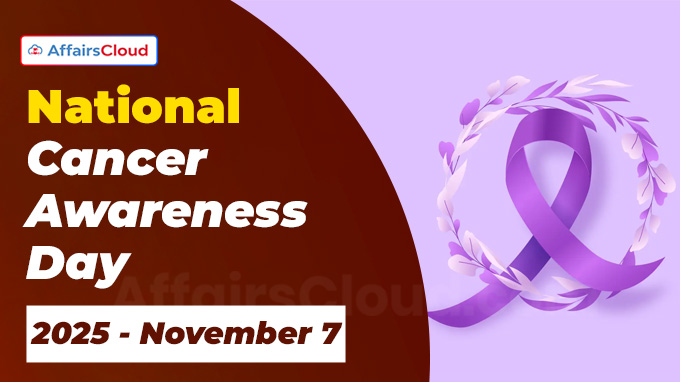National Cancer Awareness Day (NCAD) is observed every year on 7th November across India to promote awareness about cancer prevention, early detection, and treatment.
Exam Hints:
- Event: National Cancer Awareness Day
- When? November 7
- Introduced by: Dr. Harsh Vardhan, former Union Minister of Health and Family Welfare
- First Observed: November 7, 2014
- Significance: Marks the birth anniversary of Marie Curie (born November 7, 1867), Nobel laureate in Physics (1903) and Chemistry (1911)
- Symbol: Lavender ribbon represents all cancers
- Recent Advances in Cancer Research:
- NexCAR19 (April 2024): India’s first indigenous CAR-T Cell Therapy for blood cancers
- Quad Cancer Moonshot Initiative (Sept 2024): Joint effort by India, USA, Australia & Japan
Background:
Launch: NCAD was introduced in September 2014 by former Union Minister Dr. Harsh Vardhan, Ministry of Health and Family Welfare(MoHFW).
First Observation: The first NCAD was observed on 7th November 2014.
Significance of Date: November 7 was chosen to mark the birth anniversary of Marie Curie (born on 7 November 1867), the Polish-born French physicist who won two Nobel Prizes in Physics (1903) and Nobel Prizes in Chemistry (1911).
Symbol: The lavender ribbon represents support for people affected by all types of cancer, while over 50 different coloured ribbons symbolize specific cancers and their survivors , for example, Pink for Breast Cancer and Pearl/White for Lung Cancer.
Cancer Burden in India:
Rising Cases:Cancer remains one of the most pressing public health challenges facing India today.
- With over 1.4 billion people, India faces a rising cancer burden driven by lifestyle changes, tobacco use, poor diet, and inactivity.
- According to the Indian Council of Medical Research (ICMR), the estimated number of incidences of cancer cases was more than 14 lakhs in 2023 in India.
Statistical Insight: According to the National Cancer Registry Programme(NCRP), around 800,000 new cancer cases are diagnosed annually, and the number is projected to rise significantly.
Tobacco-Linked Cancers: Tobacco-related cancers, such as oral, lung, and head & neck cancers, account for 40–50% of all cancers in men and about 20% in women.
National Initiatives for Cancer Control in India:
National Programme for Prevention and Control of Cancer, Diabetes, Cardiovascular Diseases and Stroke (NPCDCS): Launched in 2010, the NPCDCS is implemented by the Ministry of Health and Family Welfare (MoHFW) under the National Health Mission (NHM). It serves as India’s flagship initiative to prevent and control major non-communicable diseases (NCDs) such as cancer, diabetes, cardiovascular diseases, and stroke.
Ayushman Bharat – Pradhan Mantri Jan Arogya Yojana (AB-PMJAY): Launched in 2018, the AB-PMJAY is implemented by the National Health Authority (NHA) under the MoHFW.
- It represents one of the world’s largest government-funded health assurance schemes, aimed at providing universal health coverage and ensuring equitable access to quality healthcare for all, particularly for rural and economically vulnerable populations.
Strengthening of Tertiary Care for Cancer Scheme (TCCC Scheme):Launched in 2013-14, the Strengthening of Tertiary Care for Cancer Scheme is implemented by the MoHFW. It aims to expand specialized cancer treatment facilities, decentralize care, and ensure that advanced cancer services are accessible across all regions of India.
Health Minister’s Cancer Patient Fund (HMCPF): Launched in 2009, the Health Minister’s Cancer Patient Fund (HMCPF) is implemented by the MoHFW under the Rashtriya Arogya Nidhi (RAN) scheme. It provides financial assistance to patients living below the poverty line (BPL) for cancer treatment at government-recognized hospitals.
Advancing Cancer Research and Treatment:
Chimeric Antigen Receptor T-cell (CAR-T) Therapy (NexCAR19): Launched in April 2024, NexCAR19, developed by Indian Institute of Technology Bombay(IIT Bombay),Mumbai(Maharashtra), Tata Memorial Centre, and ImmunoACT.
- It is India’s first indigenous CAR-T cell therapy for blood cancers, marking a milestone in affordable and advanced cancer care.
- The project is supported by the Department of Biotechnology (DBT) under the Ministry of Science & Technology(MoS&T) and the Biotechnology Industry Research Assistance Council (BIRAC) under the National Biopharma Mission.
Quad Cancer Moonshot Initiative: Started in September 2024 by India, the United States of America(USA), Australia, and Japan, the initiative targets cervical cancer elimination across the Indo-Pacific through vaccination, screening, and global collaboration in cancer research.





